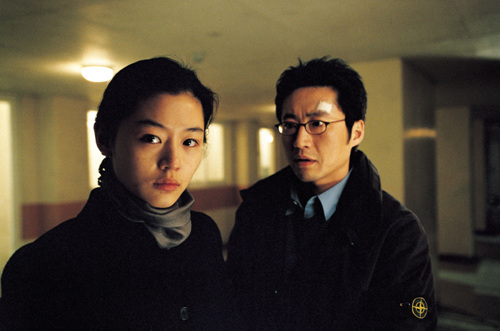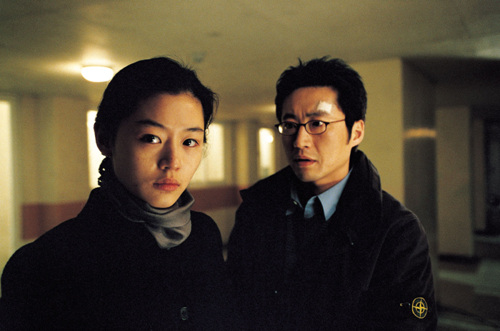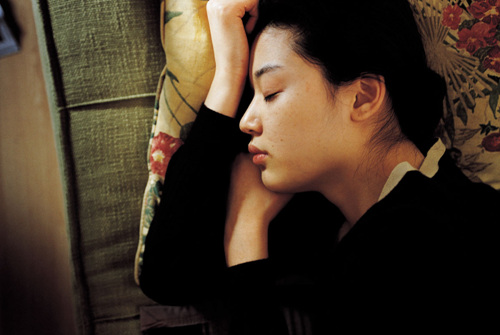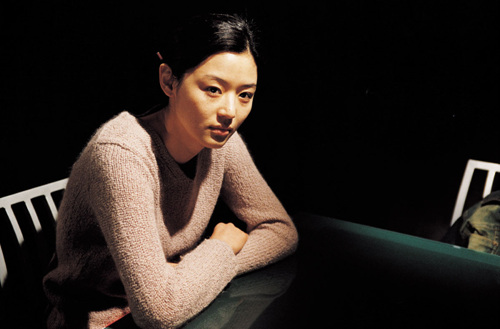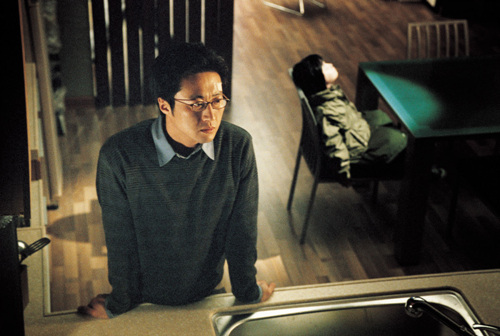6th(2004)
The Uninvited / Sainnyong Siktak
LEE Sooyoun
- Korea
- 2003
- 125min
- 35mm
- color
SYNOPSIS
The Uninvited sets the extremity of infanticide between the two axles of childbirth and maternity, and severe depression and extreme poverty. It treats the world that Yun, a woman who can see what can’t be seen, and Jung-won, a man who has to see what he sees. The film is amazing in its careful and multi-faceted treatment of extreme situations and problems. Most of all, it is remarkable in the skillful reproduction of living areas such as the apartment or the subway and other city areas, labyrinths and/or ruins, that are interrelated but at the same time thoroughly isolated, and of the roads in between that link or cut off them, inside a shot and in the connection of cuts. The image of Yun defenselessly falling unconscious in that indifferent space is almost indescribably pitiful.
Cho Yong-kyu’s cinematography, together with Lee Soo-yeun’s directing and editing, is worth noting. His camera is frightfully exact in catching the spaces of everyday life, and though a bit excessive, the sequence of the outside view into the apartment and the coloring of people like rain falling is very impressive. In the sense of politics of city space, The Uninvited evokes the historical politics of the city space of Chicago in The Candy Man, where the redevelopment of the ghetto formerly inhabited by African Americans is a ground zero for dirty corruption and for bringing forth the ghost of the past in Candy Man. At the same time, it can also be read in comparison to the Taipei in Edward Yang’s Taipei Story, a modern city space where mystery, murder, crime, and illicit affairs happen. (Kim Soyoung)
Cho Yong-kyu’s cinematography, together with Lee Soo-yeun’s directing and editing, is worth noting. His camera is frightfully exact in catching the spaces of everyday life, and though a bit excessive, the sequence of the outside view into the apartment and the coloring of people like rain falling is very impressive. In the sense of politics of city space, The Uninvited evokes the historical politics of the city space of Chicago in The Candy Man, where the redevelopment of the ghetto formerly inhabited by African Americans is a ground zero for dirty corruption and for bringing forth the ghost of the past in Candy Man. At the same time, it can also be read in comparison to the Taipei in Edward Yang’s Taipei Story, a modern city space where mystery, murder, crime, and illicit affairs happen. (Kim Soyoung)
PROGRAM NOTE
The Uninvited sets the extremity of infanticide between the two axles of childbirth and maternity, and severe depression and extreme poverty. It treats the world that Yun, a woman who can see what can’t be seen, and Jung-won, a man who has to see what he sees. The film is amazing in its careful and multi-faceted treatment of extreme situations and problems. Most of all, it is remarkable in the skillful reproduction of living areas such as the apartment or the subway and other city areas, labyrinths and/or ruins, that are interrelated but at the same time thoroughly isolated, and of the roads in between that link or cut off them, inside a shot and in the connection of cuts. The image of Yun defenselessly falling unconscious in that indifferent space is almost indescribably pitiful.
Cho Yong-kyu’s cinematography, together with Lee Soo-yeun’s directing and editing, is worth noting. His camera is frightfully exact in catching the spaces of everyday life, and though a bit excessive, the sequence of the outside view into the apartment and the coloring of people like rain falling is very impressive. In the sense of politics of city space, The Uninvited evokes the historical politics of the city space of Chicago in The Candy Man, where the redevelopment of the ghetto formerly inhabited by African Americans is a ground zero for dirty corruption and for bringing forth the ghost of the past in Candy Man. At the same time, it can also be read in comparison to the Taipei in Edward Yang’s Taipei Story, a modern city space where mystery, murder, crime, and illicit affairs happen. (Kim Soyoung)
Cho Yong-kyu’s cinematography, together with Lee Soo-yeun’s directing and editing, is worth noting. His camera is frightfully exact in catching the spaces of everyday life, and though a bit excessive, the sequence of the outside view into the apartment and the coloring of people like rain falling is very impressive. In the sense of politics of city space, The Uninvited evokes the historical politics of the city space of Chicago in The Candy Man, where the redevelopment of the ghetto formerly inhabited by African Americans is a ground zero for dirty corruption and for bringing forth the ghost of the past in Candy Man. At the same time, it can also be read in comparison to the Taipei in Edward Yang’s Taipei Story, a modern city space where mystery, murder, crime, and illicit affairs happen. (Kim Soyoung)
Director
-
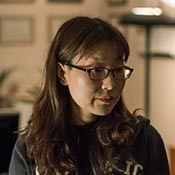
LEE SooyounLEE Sooyoun
Born in Seoul, 1970. LEE Sooyoun graduated from Ewha Womans University and Chung-Ang University’s graduate school before majoring in film direction at the Korea Academy of Film Arts. She made her feature debut in 2003 with The Uninvited, starring Gianna JUN. LEE won the Best New Director Award at the Paeksang Art Awards, as well as the Sitges Fantastic Film Festival’s Citizen Kane Award for the Best New Director. She went on to direct segments in several anthology films including Twentidentity (2004), Ten Ten (2008) and Modern Family (2012). She won the CINDI Film Festival’s Movie Collage Award and the Jury Award at Firenze Korean Film Festival with E.D. 571.
Credit
- ProducerOh Jung-wan 오정완
- Cast Jun Ji-hyun 전지현, Park Shin-yang 박신양, Yu Sun
- Screenwriter Lee Soo-yeun 이수연
- Cinematography Cho Yong-kyu 조용규
- Editor Kyung Min-ho 경민호
- Music Jang Young-kyu 장영규

